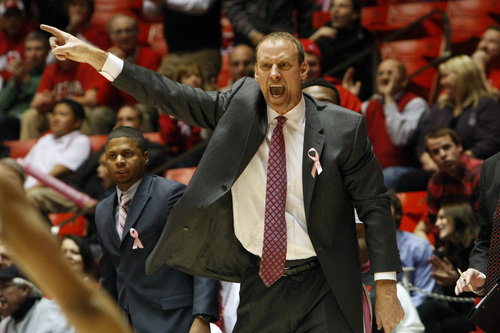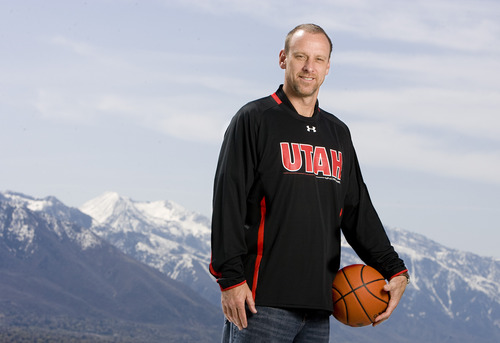This is an archived article that was published on sltrib.com in 2014, and information in the article may be outdated. It is provided only for personal research purposes and may not be reprinted.
The weakest schedule in all of Division I college basketball helped Utah go 11-1 in November and December.
So what happens in January?
The Pac-12 season that begins Thursday with No. 10 Oregon's visit to the Huntsman Center will deliver a series of shocks, after the comfortable ride the Utes have experienced against the likes of Evergreen State, Lamar and St. Katherine. The issue becomes how Utah will perform in tough games — especially away from home.
"We haven't faced a whole lot of adversity in this preseason," said coach Larry Krystkowiak, "and we know there's going to be those moments of truth."
That's when the genuine degree of Utah's progress will be revealed. In their only road game to date, the Utes lost to Boise State, 69-67. Otherwise, they're not conditioned to tense situations, having won by an average of 30 points against the country's No. 351-ranked list of opponents, according to the Sagarin Ratings.
Krystkowiak's defense is sound. He can explain the scheduling approach by citing history, Utah's 6-25 record in his first season.
"I didn't have any idea that we were going to be where we were this year," he said. "You don't make the schedule six weeks before the season starts. I don't expect any sympathy, but we did have a six-win season two years ago, and two years ago is when some of these games were scheduled. I didn't know what our team was going to look like."
Any criticism of Utah's schedule, then, becomes a compliment to Krystkowiak's recruiting. Now that the Utes have sophomores Jordan Loveridge and Brandon Taylor and junior college transfer Delon Wright, they clearly would have been well served to play a tougher schedule in 2013-14. Krystkowiak said so this week, but he always knows there's no opportunity to go back and rework anything.
So the Utes will have to find out for themselves what happens when life is not so easy, when they're no longer shooting 54 percent from the field or holding opponents to 37 percent. Of those 18 conference games, maybe 10 or 12 will come down to a few critical possessions.
The Utes' response in those moments will determine how much progress they can make this season. Based on their personnel, if they could earn three Pac-12 wins in 2011-12 and five in 2012-13 (plus two in the conference tournament), they should be capable of between seven and 11 victories in 2013-14.
Krystkowiak never talks about a timetable for rebuilding, but the Utes have to be ahead of anybody's schedule at the moment. The program's growth confirms that a couple of really good players can make a huge impact in basketball, and Loveridge and Wright have elevated Utah into the middle tier of the Pac-12.
Well, that's assuming the Utes' nonconference success is not totally deceiving. Football aside, Utah is gradually establishing itself in the Pac-12. The women's soccer, volleyball and basketball teams have combined for slightly less than a winning record in their most recent conference seasons and now Krystkowiak's club appears capable of a .500 mark in the league.
Such success was inconceivable as of two years ago, when the Utes once trailed Oregon 34-2 after 13 minutes. If anything, Krystkowiak benefits from having suffered through that season, because it created such a low baseline that his progress is magnified.
The Utes are respectable again, that's fair to say. But much more will be discovered about them. The next 18 games — plus the conference tournament, and whatever happens after that — will determine where this program stands, in ways that BYU and the few other recognizable names on Utah's nonconference schedule couldn't do.
Twitter: @tribkurt





